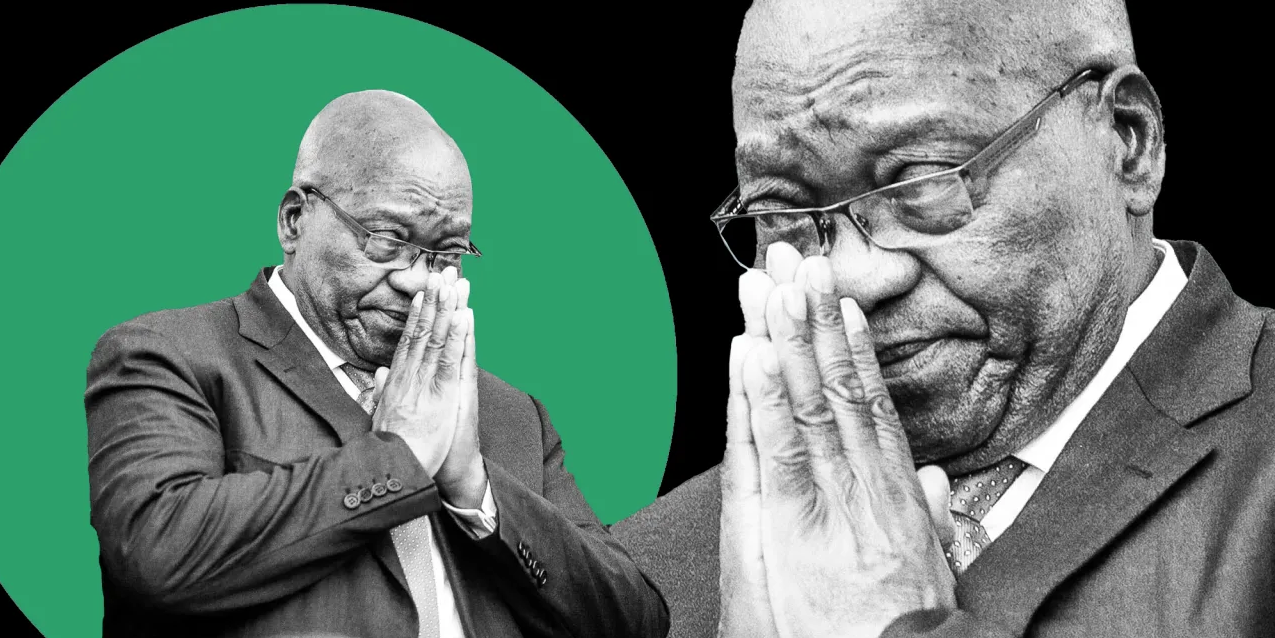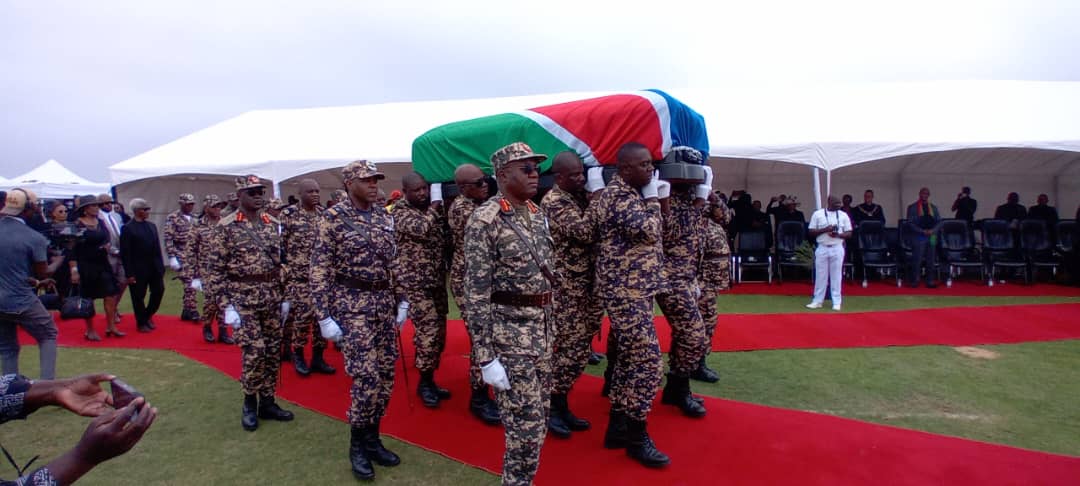While the political choices of 68% of South Africa’s voters are represented in the new coalition government, the leader of the biggest group that is not represented, former president Jacob Zuma, has again made multiple threats. His ‘statement to the nation’ on Sunday again reveals his obsession with, and perhaps hatred of, President Cyril Ramaphosa.
uMkhonto Wesizwe (MK) leader Jacob Zuma’s address on Youth Day was his first public response to the formation of the new coalition government and the National Assembly’s election of Cyril Ramaphosa for another term as President late on Friday night.
Zuma stated:
“uMkhonto Wesizwe is of the strong view that the 2024 elections were rigged and that the results announced by the IEC are not a true reflection of the will of the people. Before and after the results, we have presented concrete evidence to the IEC showing widespread irregularities in the voting process and the voting system. It has all fallen on deaf ears.”
Zuma is far from the truth.
His party has not presented any evidence of “vote-rigging”. Even in legal papers supporting the party’s court challenge to the National Assembly sitting on Friday, it claimed that it had evidence the election results were not correct, but that it would not provide the evidence “at this stage”.
The MK spokesperson, Nhlamulo Ndhlela, has refused to provide any evidence to back up what his party says, despite many opportunities to do so.
The only conclusion that can be drawn from this is that MK has no evidence, that the evidence does not exist and that they are deliberately lying.
Accordingly, Zuma’s claims that they will go to international courts will also fall flat.
Evidence matters.
MK has displayed none.
‘Roman and Dutch people’
This leads to Zuma’s attack on our legal system (MK states in its manifesto that there should not even be a Constitution and that Parliament should be sovereign, the final decision-maker in everything).
Zuma appeared to say in his prepared statement that SA’s legal system “cannot be the best if it has eyes to choose who does not be suitable to Roman and Dutch people [sic], but not for us as Africans”.
Again, this is about his claim that the legal system is biased against him.
However, it should not be forgotten that historically the “law” has never really worked for black people in SA. First, were the colonial laws, followed by the laws of apartheid. While the current system is supposed to fundamentally change that, the lived experience of many black people is that police officers abuse their powers and still use violence against them.
This is why Zuma attacks the law so often, as he knows that for most people listening to him, the law has not only not worked for them, but often worked against them. That he was president and head of the state while this happened was conveniently unimportant for this argument.
His closing comments will also have a strong resonance. He quoted the founders of the original, ANC-inspired Umkhonto weSizwe, whom, he said, in 1961 stated, “There comes a time in the life of any nation where there remain only two choices: submit or fight.”
Obsession and vendetta
Zuma appears to be obsessed with Ramaphosa, claiming the apartheid government “regimes could not have lasted even one day without black collaborators such as Ramaphosa”.
First, on the historical record, his claim cannot be substantiated. Ramaphosa spent several months in solitary confinement and was interrogated by apartheid agents. He has explained these events in Parliament. Biographers have referred to it, and there is nothing in the historical record to suggest that what Zuma claims is true.
Second, if this was true, why then did Zuma ask Ramaphosa to be the deputy leader of the ANC in 2012 (at the suggestion of Ace Magashule), and then appoint him Deputy President?
Again, this is about his vendetta against the person who defeated his side at the ANC’s 2017 conference and then worked him out of power in 2018. (For those who doubt the depths of Zuma’s feelings on this, it is worth viewing, again, his reaction to the 2017 ANC conference leadership results as caught by the journalist Nickolaus Bauer.
This may be causing him to make decisions that are less than rational.
For example, in his address on Sunday, he confirmed that MK would “soon occupy its seats in the National Assembly”.
Already, on Saturday, MK MPs were sworn in to the National Council of Provinces. This followed the party’s statement that its members would not take the oath in the National Assembly as a protest against the election results. But they did occupy their seats in the provincial legislatures around the country.
Nothing was achieved by the decision to boycott one sitting while attending all of the others.
So then, why was it done? What was the point?
At the same time, there are already indications that the MK caucus in the KwaZulu-Natal legislature will be less than unified. It’s been reported that several members of the party “traded blows” over who would represent the party in that chamber, ahead of Friday’s first sitting.
Considering that the party’s former interim secretary-general Sihle Ngubane has said that every decision about the party’s lists was made by Zuma and that this has now been disputed by the Nhlamulo, there might well be more confusion to come.
‘Progressive Caucus’
One of the most important questions about our new political era is how the opposition parties, those outside the governing coalition, will work together.
Zuma appears to believe that the new (seriously misnamed) “Progressive Caucus” will be a single unified voice in opposition to this government.
This is unlikely.
First, the biggest party in this group, after MK, is the EFF. And Zuma and EFF leader Julius Malema have never been able to work together. (While Ramaphosa chaired the appeals committee that expelled Malema, it was Zuma who started that process.)
Second, several of these parties may be vulnerable to temptation and the ANC could still invite them into the new coalition.
Third, this all presupposes that the MK caucus itself will be able to work together. It is not even clear at this stage who will lead this caucus.
At the weekend, the Sunday Times reported that several parties had received phone calls from different people all claiming to represent Zuma in coalition negotiations, with the result that it was not able to form coalitions with anyone.
All of this suggests there is instability in the party.
While Zuma may now have decided to go to the National Assembly, he also said, “We will therefore at the right time call on our people to demonstrate their dissatisfaction against all these injustices, peacefully, in the streets, in the courts and even in Parliament, until our grievances have been addressed.”
While this is not in itself a threat of violence, the fact the SA Police Service has sent so many police officers to KZN (more were sent over the weekend — before Zuma’s address) suggests the authorities are taking no chances.
Hanging over all of Zuma’s comments is the 2021 violence. It is that horrific and chaotic week, when so many people died after he was arrested, which gives a sense of dread to his every move.
Remove that, and the claims of vote-rigging and the angry personal nature of his attacks on Ramaphosa all sound hollow, as empty as the rest of his rhetoric.
South Africa’s politics is realigning itself fundamentally. Much may still change, and those who move quickly and rationally can benefit.
But making rational choices will be crucial.
MK may find itself losing out in the long term because of the unstrategic choices it is making at this moment. Unless everything — as so many times before with Zuma — is about chaos and mayhem.
Stay informed with The Namibian – your source for credible journalism. Get in-depth reporting and opinions for
only N$85 a month. Invest in journalism, invest in democracy –
Subscribe Now!










